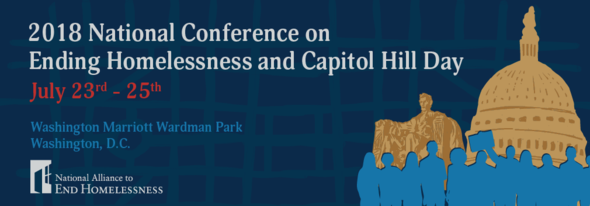|
May 1, 2018
Please forward to your sub grantees and contact your OFAH grant manager
if you have any questions.

We hope to see you at the 2018 Conference on Ending Homelessness May
22 - 23 in Yakima! A pre-conference training on student homelessness kicks
off on May 21. Conference information and registration can be found at the
Washington Low Income Housing Alliance website.
Conference presenters
and speakers include services providers, people who have experienced
homelessness and other community leaders with innovative ideas and urgent
actions to get people housed. We are looking forward to keynotes by community organizer Toya Andreka-Jean Thomas, Washington State Attorney General Bob
Ferguson and Marc Dones, project director for *Supporting
Partnerships for Anti-Racist Communities (SPARC), whose recent report on racial inequity and homelessness
was highlighted in the March Office of Adult and Family Homelessness (OFAH) newsletter.
Look for Commerce
staff participating in the following sessions and discussions:
May 22
7:30 – 8:15 a.m. Low
Barrier Shelter and Housing Breakfast Meeting
9:20 - 10:50 a.m. The Why and How of
Low Barrier Housing
11:10 a.m. - 12:25 p.m. Real
Talk and Data Walk
2 – 3:30 p.m. Washington State Coordinated Entry
Guidelines Meeting
3:50 – 5:05 p.m. Medicaid Housing
and Employment Services for People who are Homeless
May 23
7:30 – 8:45 a.m. HOME Tenant-Based Rental Assistance (TBRA) Breakfast
Commerce will also have a vendor booth with computer access to our Homeless System Performance page. Stop by and say
hello.
*Note: A previous version of this e-mail referred to SPARC incorrectly as Seattle Parks and Recreation. In this instance, the acronym stands for Supporting
Partnerships for Anti-Racist Communities.
While Commerce prepares to submit the federal Point-in-Time
(PIT) data to U.S. Housing and Urban Development (HUD), Commerce also makes available “supplemental
administrative snapshots” year round.
The Washington state departments of Commerce, Social and Health Services,
Corrections, Employment Security and Health all submit client level data to the state’s Research and Data Analysis
(RDA) database.
These snapshots look at all of the people who touch those systems, checking to see if they
receive basic food assistance and their housing status for the months of January and
July.
These snapshots are useful tools when evaluating
local PIT data to better understand how many people experiencing homelessness
are accessing food assistance that may not be accessing the local homeless
crisis response system. Let us know how your community uses this data to
evaluate need and plan for a more comprehensive response.
The snapshots are located on Commerce's HMIS page
under DSHS – HMIS Matched Data Analysis.
Beginning in September, landlords will no longer be allowed
to refuse to rent to someone because they use rental or income assistance
to help pay the rent. Commerce is interested in learning how homeless service
providers will educate landlords and clients with this new information. Please
reach out to Kathy Kinard at Kathy.kinard@commerce.wa.gov with your ideas.
This summer, Commerce will launch the new Landlord Mitigation
program created through House
Bill 2578 (ensuring housing options). That bill created a new program intended
to help pay some move-in repairs and some eligible damages to private-market
and nonprofit landlords. Our first step will be to hire staff to develop and
deploy the new program later this year.
We need your help to start our outreach efforts to landlord
liaisons through this six-question
survey to build a list of interested parties around the state and other local
incentive programs:
https://www.surveymonkey.com/r/FTJLNTH
Contact Cary Retlin at
cary.retlin@commerce.wa.gov if you have questions about
the new Landlord Mitigation Program.
 |
|
Myth: Commerce's monitoring of grantees that include “monitoring findings” result
in funding decreases or other punitive actions.
Fact: “Monitoring Findings” in
a Commerce monitoring report result in corrective actions for what Commerce has
determined to be out of compliance with contractual requirements or program
guidelines. Monitoring is required to ensure that public funds are being spent
on activities that are allowable and appropriate to end homelessness. It is also an opportunity to provide Commerce with information about your program
operations and systems work, and for Commerce staff to provide guidance,
assistance and training.
|
State homeless housing
service providers need to be aware of important changes to the Washington State
Extended Foster Care (EFC) program that will take effect on July 1. Key
changes include:
- The
opportunity to enroll in the program until age 21.
- The
option to unenroll/reenroll in the program from ages 18-21 as needed.
-
The
option for foster youth who were in a trial return home, on an extended run
from care, or in a JRA facility on their 18th birthday to enroll.
Mary
Van Cleve of Columbia Legal Services created this fact sheet with additional
information and has offered to answer questions and provide training. She can
be reached at mary.vancleve@columbialegal.org.
OFAH staff alerted Consolidated
Homeless Grant (CHG) lead grantees that Housing Search NW will be deactivated
in the coming weeks. Some grantees use this site to meet the CHG requirement to
provide an “interested landlord list” for people seeking housing assistance. (Section
2.2 of the CHG Guidelines). Grantees will need to plan for an alternative
method to meet this requirement. Contact your grant manager if you have
questions.
April 11 marked 50
years of the Fair Housing Act signed by President Lyndon Johnson. The Fair
Housing Act prohibits discrimination because of race, color, religion, national
origin, sex, disability and familial status. Knowledge of, and adherence to, the
Fair Housing Act is imperative in homeless housing work. Check out the
following resources about the Fair Housing Act: http://fhact50.org/history/
https://www.hud.gov/program_offices/fair_housing_equal_opp/aboutfheo/history
https://www.hud.gov/fairhousingis50
If you’re at the
Conference for Ending Homelessness in Yakima next month, look for the session Fair Housing Rights and Regulations
presented by staff from the Fair Housing Center of Washington on Tuesday, May
22 from 2 – 3:30 p.m.
Administration of
the HOPWA program is moving from Commerce to the Department of Health
(DOH). DOH administers the Ryan White program, a medical care program for
persons diagnosed as HIV+. HUD has been advocating for HOPWA and Ryan
White to be co-managed by the same grantee; this allows for better coordination
between funding sources, and streamlines service delivery to eligible
clients. The current HOPWA competitive grants expire May 31, and DOH
will execute new contracts beginning June 1. The HOPWA formula grants expire
June 30, and DOH will also execute new contracts July 1. Project sponsors
will not experience any lapse in contracting due to the administrative switch.
 The National Conference on Ending Homelessness will be held July 23 - 25 in Washington, D.C. This will be an informative and productive
conference, including Capitol Hill visits and a chance to meet and
collaborate with like-minded individuals who are working toward the
shared goals of ending homelessness in America. Register here.
|